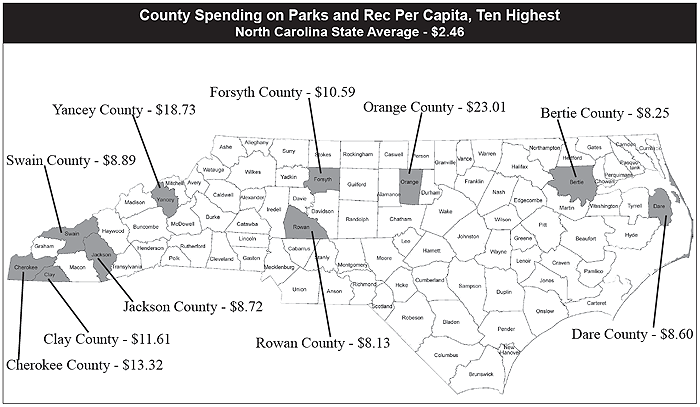Parks and Recreation
Recommendations
Cities and counties should restructure their parks and recreation departments to eliminate activities and services that are offered or could be offered by private businesses and those that serve only a small minority of residents. Local governments should also implement user fees to recover the full costs of services that benefit only specialized groups.
Background
Traditionally, city and county parks and recreation (P&R) departments provided the public with parks and user-fee-supported sports leagues — soccer, softball, etc.
Now, many P&R departments have expanded well beyond these boundaries. Some provide uncommon services that benefit only a handful of citizens, such as golf courses and equestrian centers. P&R departments also provide many services and facilities already offered by the private sector — full-service gyms, martial arts instruction, etc. These tax-supported P&R activities unfairly compete with private-sector providers. It is not only that they receive tax money, but also that they don't pay taxes. Thus the taxpayer cost of these subsidized activities is not just the direct tax subsidy, but also the lost taxes that would have been paid by private providers.
|
In addition, P&R department activities result in a political constituency that benefits elected politicians and P&R bureaucrats. By providing a free or highly subsidized activity, the P&R department creates a special-interest group out of people interested in that activity who will lobby for its continuation and expansion, transferring the costs to taxpayers who may not benefit. For example, the losses incurred by city golf courses are paid by all taxpayers for the benefit of a small group of golfers, whose incomes are generally higher than the average city taxpayer's. If local P&R departments can provide yoga, kickboxing, golf courses, equestrian centers, extreme sports, cooking classes, vermicomposting (worms) classes, etc., are there any limits on what they can provide to specialized interest groups using taxpayer subsidies?
Analysis
In order to serve the parks and recreational interests of the general public rather than special interests, local government officials should follow three guiding principles to keep P&R departments within proper boundaries.
P&R departments should not compete with services already provided by the private sector (for-profit and nonprofit).
Across North Carolina, many private recreational centers provide golf courses, gyms, equestrian centers, and other activities. Those private facilities are sources of income for many North Carolinians. When P&R departments operate similar facilities, they threaten the businesses of these citizens. As government departments, they have an unfair advantage over private-sector services: their access to tax dollars shelters them from risk, and they aren’t burdened with the additional overhead cost of having to pay taxes on their facilities and land.
Public facilities also compete with private, nonprofit firms such as the YMCA. These organizations rely on user fees and private charitable donations to stay open and pay employees. Competition from taxpayer-funded P&R departments is harmful and unfair to them.
It is also unfair to shackle taxpaying individuals and businesses with the costs of providing superfluous facilities and services.
Where services are provided for specific activities, user charges should capture the total costs of those activities.
Community members who do not benefit from specialized P&R department services should not have to bear their costs. User fees should be set at levels that would capture all the costs, including capital costs, administration costs, maintenance costs, and the taxes that would have been charged had the service been provided by the private sector. For example, softball league user fees should cover the costs associated with a public softball complex. Local governments should implement accounting systems to ensure that these costs are fully recovered. P&R departments should use their limited funds to offer services that are beneficial to the entire community.
Cities and counties should divest themselves of services that are used only by a small minority of the population or the upper-income segments of the community.
When local governments use taxpayer funds to subsidize highly specialized recreational activities, they are benefiting a tiny segment of the community at the expense of the whole community. This problem has manifested itself in North Carolina most noticeably in city-owned golf courses. In general, higher-income individuals tend to use these more than others. Taxpayers should not have to fund these projects, because they do not benefit most people.
City-owned and operated golf courses also unfairly compete with private courses. The private courses pay taxes, portions of which go to subsidize their competition. In addition, many private courses are open to the public and charge green fees comparable to the subsidized rates at the city courses. P&R departments should get the most out of taxpayer funds by investing in recreational facilities and services that benefit a majority of community members without competing against local businesses.

Analyst: Sarah Curry
Director of Fiscal Policy Studies
919-828-3876 • scurry@johnlocke.org
The entire 2014 City & County Issue Guide, is available for download as a 3.6MB Adobe Acrobat file.
The free Adobe Acrobat Reader is required to view or print this document.
|


